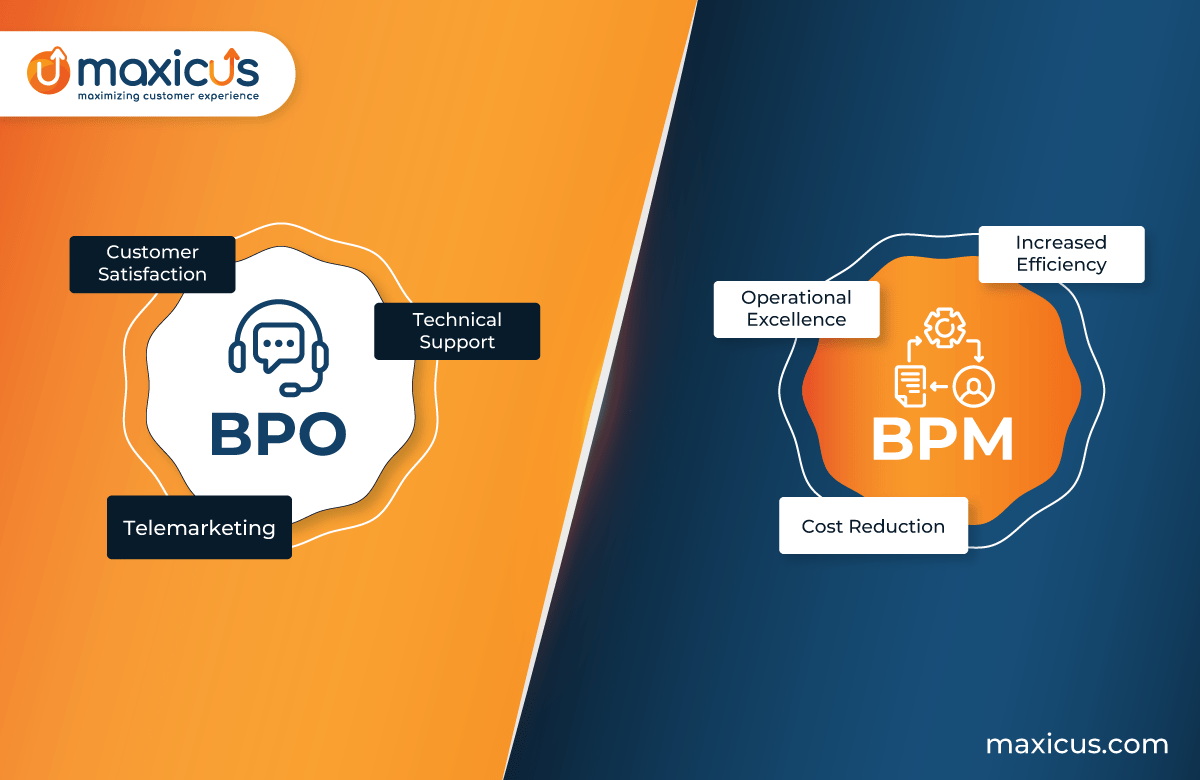Difference Between BPO and BPM
Today’s fast-paced companies strive to streamline their processes. As a result, BPM and BPO are quite popular. Though they seem to be the same, their jobs and personalities are quite different.
The article defines BPO and BPM, their benefits, and what is the basic difference between BPO and BPM. “BPO” means “business process outsourcing.” External help is hired for office duties. Appoint someone to handle HR, finances, customer service, and money. BPO helps firms save costs, improve customer service, and concentrate on their strengths. Read on to learn more about difference between BPO and BPM.
The Indian BPM industry, with revenues of $44 billion, experienced double-digit growth of over 14% in FY22E as compared to FY21. Maxicus is a well-reputed brand that you can contact to learn more about BPO and BPM services.
Types of BPO
Here are different types of BPO –
- Offshore business process outsourcing includes moving services abroad to make money.
- “Nearshore BPO” means sending to surrounding countries with similar time zones.
- Domestic outsourcing is “onshore BPO.”
Benefits of BPO
Here are some perks of BPO. Next, we will look at the difference between BPO and BPM –
- Cost Efficiency: Approximately 69% of businesses using BPO services are repeat clients. BPO’s main benefit is cost reduction. Outsourcing non-core processes may save staff, equipment, and management costs.
- Focus on Core Activities: BPO helps companies focus on their skills, boosting output and efficiency.
- Access to Expertise: Outsourcing companies provide modern technology and expert services in many sectors.
- Ability to grow: BPO services emphasize development and organizational agility.
Why do you need Business Process Management (BPM)?
Corporate operations improve with “business process management” (BPM). To achieve objectives, organizations plan, create, monitor, and improve techniques. Known as business process management. BPM improves company operations, whereas BPO engages outside assistance.
Important Parts of BPM
Here are some important parts of BPM:
- Modeling for Practice: This modeling lets you see how business processes work so you can study and understand them better.
- Process analysis: This method is used to find mistakes and possible ways to make the process better.
- Process design: You can change the way things are done to make them work better and faster. This is called process planning.
- Process Implementation: This is the process of putting new methods into place.
- Process Monitoring: Always keep an eye on how well a process is working.
- Process optimization means making changes all the time to make processes even better.
Why BPM is good?
Here are some of the good things about BPM:
- Better efficiency: By making things easier, BPM cuts down on waste and boosts working efficiency.
- Better Agility: BPM helps businesses respond quickly to changes in the business world.
- Better Quality: When methods are effective and well-planned, the quality of the goods and services is better.
- Compliance: Business process management (BPM) helps businesses follow the rules set by the government and their fields.
Tools Used in BPM
These are some tools used in BPM:
- Software for automating processes and regular jobs is called workflow automation software.
- Process modeling software makes it possible to make visual process models. Monitoring tools for performance: Check in on a process and see how well it’s going.
Important Differences Between BPO and BPM
Now that we know their differences, let’s look at the difference between BPO and BPM.
Goal
- BPO: Businesses save money and time by outsourcing jobs that aren’t their main business.
- BPM: Improving the speed and usefulness of internal processes is the main goal.
Focus
- BPO: Looks at certain business tasks or processes that are given to outside companies to do.
- BPM: Tries to improve all of an organization’s systems so that they work better as a whole.
Control
- BPO: The service provider takes charge of the outsourced tasks.
- BPM: The company controls its processes and is always looking for ways to make them better.
Cost
- BPO: The desire to cut operational costs frequently drives BPO.
- BPM: Long-term cost reductions may be achieved via business process management (BPM) by investing in technology and tools for process optimization.
Approach
- BPO: It is a strategic approach to managing non-core company functions via outsourcing.
- BPM: It is a strategic method that focuses on making processes better over time and making organizations more efficient.
These were some of the difference between BPM and BPO.
Putting BPO and BPM together
Now that we know about the difference between BPM and BPO we will learn more about BPO and BPM. BPO and BPM may work together, even though they are not the same. In fact, putting these two methods together could be very good for your business. Businesses can improve their processes (BPM) and hire outside help for non-essential jobs (BPO). Using this unified method, businesses can get the most out of both strategies. It will boost output, cut costs, and make the total performance better.
Here are some examples of how integration works:
A business might hire a specialized service provider to handle its customer service (BPO). In the meantime, it could use BPM to make its systems for handling orders and managing supplies more efficiently. So, the company promises that its processes work well and that the BPO provider takes care of customer requests well.
Conclusion
You need to know about BPM and BPO if you want your business to be more efficient and successful. BPM makes internal processes more efficient and flexible, while BPO sends jobs to other companies to save money and improve service. Businesses may be more competitive and do better if they use both methods together.
In conclusion, the major differences between BPO and BPM are their goals, scope, control, costs, methods, and how they are put into action. To learn more about BPO and BPM, check out the official site of Maxicus.
BPO is all about hiring to save money and free up resources for important tasks. BPM, on the other hand, is all about improving processes inside a business all the time. Together, they make a complete plan for running a successful business.










